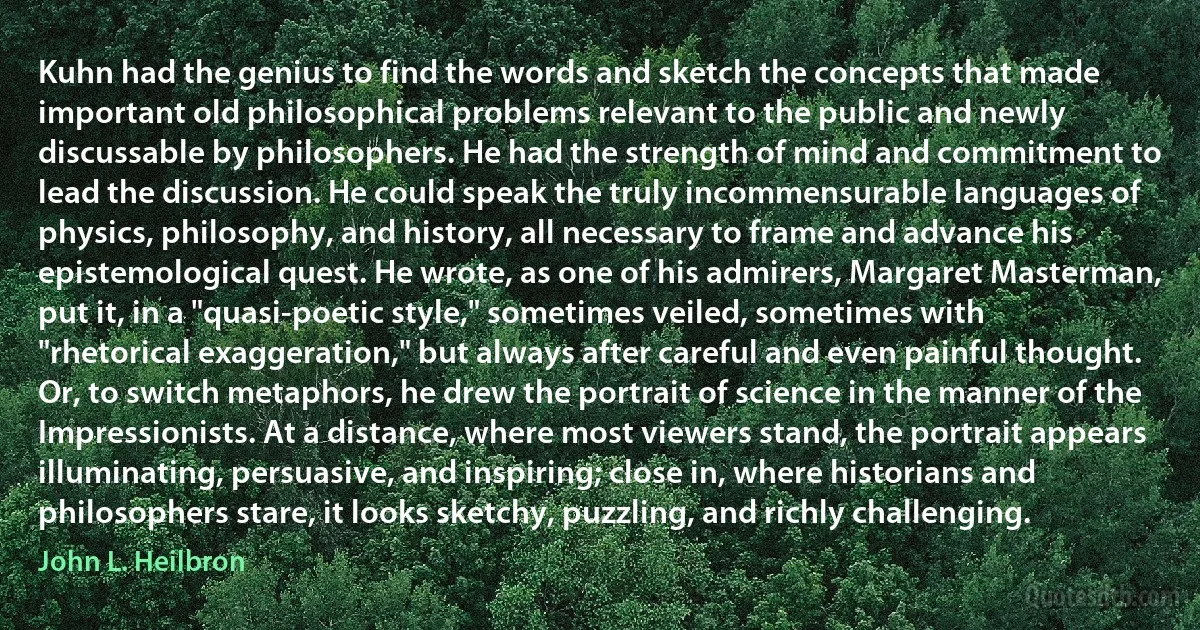
Kuhn had the genius to find the words and sketch the concepts that made important old philosophical problems relevant to the public and newly discussable by philosophers. He had the strength of mind and commitment to lead the discussion. He could speak the truly incommensurable languages of physics, philosophy, and history, all necessary to frame and advance his epistemological quest. He wrote, as one of his admirers, Margaret Masterman, put it, in a "quasi-poetic style," sometimes veiled, sometimes with "rhetorical exaggeration," but always after careful and even painful thought. Or, to switch metaphors, he drew the portrait of science in the manner of the Impressionists. At a distance, where most viewers stand, the portrait appears illuminating, persuasive, and inspiring; close in, where historians and philosophers stare, it looks sketchy, puzzling, and richly challenging.
John L. HeilbronRelated topics
advance challenging close distance drew find frame genius history incommensurable inspiring lead mind necessary persuasive portrait public puzzling rhetorical science sketch speak stand strength thought words Kuhn looksRelated quotes
To my complete surprise, that exposure to out-of-date scientific theory and practice radically undermined some of my basic conceptions about the nature of science and the reasons for its special success.
Those conceptions were ones I had previously drawn partly from scientific training itself and partly from a long-standing avocational interest in the philosophy of science. Somehow, whatever their pedagogic utility and their abstract plausibility, those notions did not at all fit the enterprise that historical study displayed. Yet they were and are fundamental to many discussions of science, and their failures of verisimilitude therefore seemed thoroughly worth pursuing. The result was a drastic shift in my career plans, a shift from physics to history of science and then, gradually, from relatively straightforward historical problems back to the more philosophical concerns that had initially led me to history.

Thomas Samuel Kuhn
What! when it is necessary to take the most simple resolve, we are under the domination of our habitudes, our wants, our social relations, and a host of causes which, all of them, draw us about in a hundred different ways. These influences are so powerful, that we have no difficulty in telling, even when referring to persons whom we are scarcely acquainted with, or even know not at all, what is the resolution to which they will lead such parties. Whence, then, this certainty of foresight, exemplified by you daily, if you were not convinced, at the outset, that it is extremely probable the empire of causes will carry it over free-will. In considering the moral world a priori, you give to this free-will the most entire latitude; and when you come to practice, when you speak of what passes around you, you constantly fall into contradiction with yourselves.

Adolphe Quetelet
And as for the close connection between philosophy and poetry, we can refer to a little-known statement by Thomas Aquinas in his Commentary on Aristotle's Metaphysics [I, 3]: the Philosopher is akin to the Poet in this, that both are concerned with the mirandum, the "wondrous," the astonishing, or whatever calls for astonishment or wonder. This statement is not that easy to fathom, since Thomas, like Aristotle, was a very sober thinker, completely opposed to any Romantic confusion of properly distinct realms. But on the basis of their common orientation towards the "wonderful" (the mirandum - something not to be found in the world of work!) - on this basis, then, of this common transcending-power, the philosophical act is related to the "wonderful," is in fact more closely related to it than to the exact, special sciences; to this point we shall return.

Josef Pieper
The chief distinction in the intellectual powers of the two sexes is shewn by man attaining to a higher eminence, in whatever he takes up, than woman can attain - whether requiring deep thought, reason, or imagination, or merely the use of the senses and hands. If two lists were made of the most eminent men and women in poetry, painting, sculpture, music, - comprising composition and performance, history, science, and philosophy, with half-a-dozen names under each subject, the two lists would not bear comparison. We may also infer, from the law of the deviation of averages, so well illustrated by Mr. Galton, in his work on 'Hereditary Genius,' that if men are capable of decided eminence over women in many subjects, the average standard of mental power in man must be above that of woman. ... Thus man has ultimately become superior to woman.

Charles Darwin
Among others, Doctor Caritens died during a momentary absence of my father, who recommended while stepping into his travelling chariot, to bleed the Doctor a second time. I did as he bid me, although convinced that emetics and opening medicine would cure the patient without fail; the Doctor died, and you may easily imagine the state of my feelings. I had just begun to publish a work on practical physic, but had no heart to finish it after this sad catastrophe. I betook myself again to philosophy. I wished daily to return to Gottingen, if I could do so with honour. I passed three years under such painful circumstances, when my friend Leisewitz invited me to go with him to Berlin, for which purpose his brother-in-law in Brunswick would advance me money to defray my expenses. Without much consideration, I accepted the invitation, and my portmanteau was soon ready.

Albrecht Thaer
